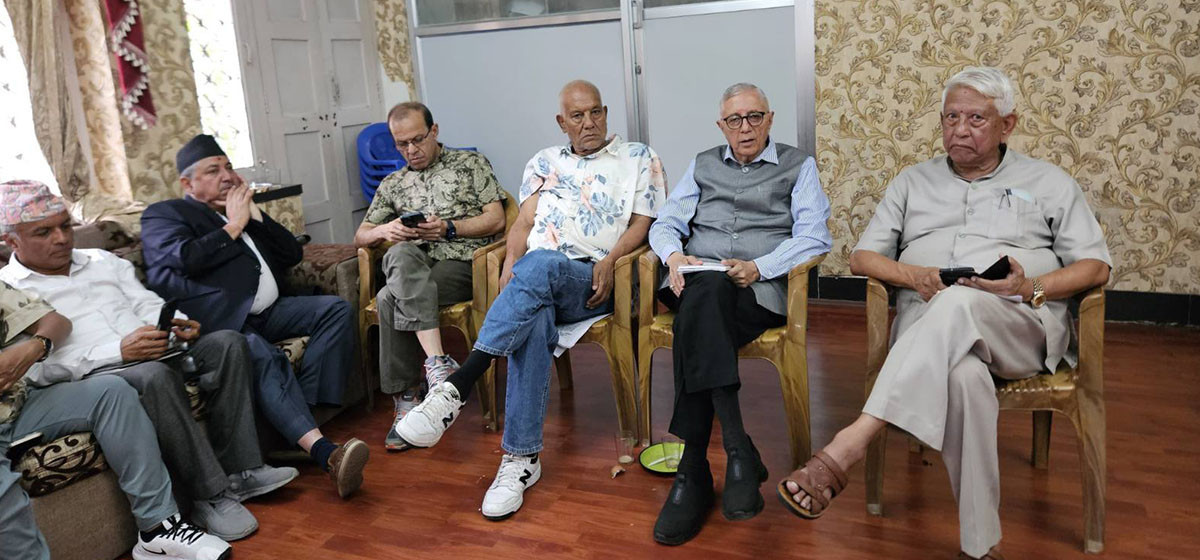KATHMANDU, Aug 1: The CPN (Maoist Centre) has begun internal discussions on whether to take disciplinary action against the party’s Deputy General Secretary, Janardan Sharma.
As the internal conflict with Chairman Pushpa Kamal Dahal intensifies, leaders aligned with Dahal have begun demanding disciplinary action against Sharma. Some office bearers raised this issue in a recent meeting, citing concerns over party discipline.
During the office bearers’ meeting, General Secretary Dev Gurung—indirectly targeting Sharma—presented a proposal for "internal party unity," which has now been forwarded for discussion in the upcoming Standing Committee meeting scheduled for Friday.
A comprehensive proposal has been prepared to manage the internal dispute. Titled "Internal Party Unity," it will first be discussed in the Standing Committee and then in the Central Committee.
In Wednesday’s meeting of the central office bearers, Gurung formally presented the proposal. The party has stated that it will be seriously discussed in Friday’s Standing Committee meeting. Additionally, voices within the Standing Committee have also called for disciplinary measures against Sharma over the issues he has raised.
Disciplinary action in NC infuriates Shekhar faction

Sharma has publicly advocated for party restructuring through a special general convention, leadership change, and the revival of internal democracy (democratic centralism), making the matter a central agenda in the upcoming meetings.
Following Chairman Dahal’s public expression of dissatisfaction—indirectly accusing some leaders of "playing tricks"—Sharma’s proposal and the issue of disciplinary action have now converged.
“One of our office bearers said that raising internal party matters in public forums is itself a disciplinary issue, and therefore must be discussed in the Standing Committee,” said a Maoist Centre leader, asking not to be named.
While Chairman Dahal, speaking at the Pushpalal Memorial Assembly on July 23, claimed the party had ensured the highest practice of “people’s democracy,” Sharma, just two days later, posted a four-point proposal on social media demanding a special general convention.
“Even now, some comrades seem to think they have the opportunity to play little games. I have allowed them to do so quite freely,” Dahal had said. In response, Sharma published his four-point proposal online.
Addressing the party ranks through social media, Sharma stated that ongoing rumors of a party split were being propagated from within, creating confusion among both the public and party cadres—hence his call for a special general convention.
Having publicly disagreed with Chairman Dahal, Sharma reiterated his demand for a special general convention during Wednesday’s office bearers’ meeting and presented his four-point proposal there as well.
Sharma appears to be positioning himself to challenge Dahal’s leadership at the next general convention. “I urge vigilance against those who continue to sow confusion among the people and party cadres by fueling rumors of a party split—rumors that have originated from the top leadership over the past two years,” Sharma said. He urged deeper reflection on the doubts and facts surrounding the current state of the Maoist Centre.
“Following last year’s consultation meetings in all provinces and the discussions and decisions of the Central Committee, it was decided that a special general convention would begin in July and be completed within six months. Let’s now engage in an agenda-focused internal debate. This will help reorganize, strengthen, and systematize the party. We must conduct a serious self-assessment to regain the party’s lost credibility after the two-point agreement, using the momentum from the Hulaki Highway and Pushpalal Highway campaigns,” he said.
Sharma added that restructuring the economy and transforming the socialism-oriented framework defined in the constitution into policy-based structures—with new standards for production, distribution, and inclusive development—would help revitalize the crisis-hit economy. “This will help lay the foundation for a self-reliant and socially just society through the social and cultural transformation of economic production and employment,” he said.
Sharma also stressed the importance of identifying problems and offering concrete solutions to address rising misgovernance, manipulation in law-making, rampant corruption, and neglect of public concerns—all of which, he said, have led to widespread frustration.
“Constitutional amendments, restructuring of the governance system, electoral reforms, and changes in identity and economic sectors—these agendas will unite the nation. The special general convention will address ideological ambiguity, political confusion, organizational chaos, and lawlessness within the party. It will also develop a concrete work plan to meet the aspirations and dreams of the new generation through comprehensive party reorganization,” Sharma said.



_20230802105002.jpg)
































